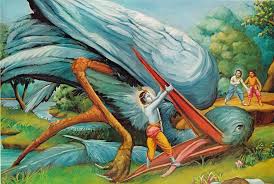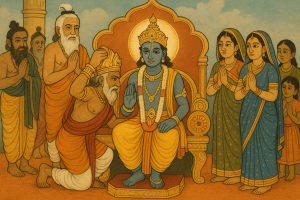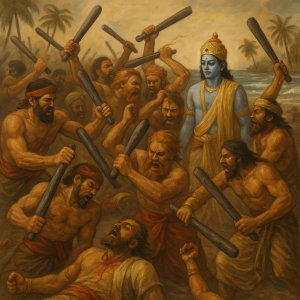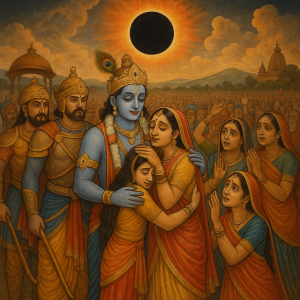The Forest of Vṛndāvana Becomes a Playground of the Divine
After the peaceful relocation of the residents of Vraja to the enchanting groves of Vṛndāvana, every day brought new joy and new divine pastimes. The calves roamed free, the gopas played with their flutes, and Śrī Kṛṣṇa, along with Balarāma and the cowherd boys, would go daily into the forest, herding the calves and enjoying their childhood games.
But the dark shadow of Kaṁsa’s fear still loomed. He continued to send demon after demon to Vṛndāvana in hopes of destroying the child whom the prophecy had declared would be his death.
A New Danger Appears: Bakāsura
One day, as Kṛṣṇa and His friends entered the forest and sat beneath the trees sharing their meals and jokes, a strange and terrifying figure approached.
It was Bakāsura, the brother of Pūtanā and Aghāsura—a giant demon in the form of a monstrous crane. His beak was sharp like thunderbolts, and his wings covered the sky. His eyes gleamed with hatred, and his heart burned with revenge for his sister’s death.
He swooped down swiftly and swallowed Kṛṣṇa in one gulp, thinking he had succeeded in killing the Lord.
The Miracle of the Lord’s Presence
The cowherd boys cried out in horror. Some fainted. Others shouted in pain and fear.
But within Bakāsura’s throat, Kṛṣṇa expanded His transcendental energy, becoming so hot and heavy that the demon could not bear it.
Unable to digest the Lord, Bakāsura spat Kṛṣṇa out, his throat scorched by the divine fire.
The Lord Destroys the Demon Effortlessly
Then, with lightning speed, Kṛṣṇa jumped upon Bakāsura, grabbed his sharp, deadly beak with His soft, lotus-like hands, and split it apart, as one would split a blade of grass.
With a thunderous cry, Bakāsura fell dead—his enormous body shaking the earth, terrifying the birds, and scattering the clouds.
Celestial beings began to sing hymns from the skies. The gandharvas and apsarās showered flowers. The siddhas and munis offered their blessings and prayers:
“O Lord, even in the form of a child, You defeat the most fearsome enemies. We glorify Your matchless power and Your mercy upon Your devotees.”
The Cowherd Boys Rejoice
Seeing Kṛṣṇa standing unharmed and smiling, the cowherd boys danced with joy. They clapped and embraced Him.
To them, this was yet another exciting game. They did not fully realize that their dearest friend had just slain a mighty demon with a mere touch.
They returned to Vraja, singing the story of the great bird and their hero Kṛṣṇa.
Nanda and Yaśodā’s Unknowing Love
As always, the parents of Kṛṣṇa remained unaware of the true nature of their son. When He returned, they simply saw their beloved child, tired and dusty from the forest, and quickly embraced Him.
“Come, my darling,” said Mother Yaśodā, “you must be so hungry!”
In this way, the all-powerful Lord continued to hide His divinity, just to relish the pure love of His devotees in the land of Vraja.
Lessons to Be Learned:
- Even the greatest threats are powerless before the Supreme Lord.
- Kṛṣṇa allows Himself to be swallowed, only to later reveal His inconceivable might. This teaches us that even in moments of apparent defeat, the Lord is fully in control.
- The Lord’s devotees, like the cowherd boys, are always protected—even when they do not understand the danger.
- Parental love (vātsalya-bhāva) for the Lord is so powerful that it blinds one to His godhood, making the loving exchange even more intimate.
- The Lord continues to enact pastimes, not for display of power, but to increase the love of His devotees and to destroy evil.
Origin of the Story: Harivaṁśa Purāṇa – Viṣṇu-parva, Chapters 25–27



